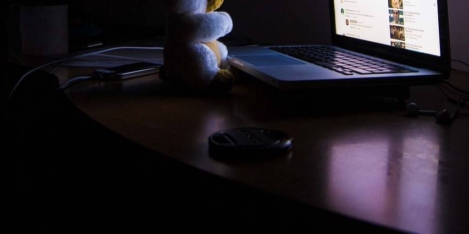May 16, 2018
Use of tech in the evening linked to sleep disruption and a range of serious mood disorders
 People should not use their laptops and mobile phones in the evening if they want to avoid sleep disruption and a range of mood disorders, including depression, claims new research from the University of Glasgow. The largest study so far into the link between disrupted body clocks and mood disorders and wellbeing has been published in the journal Lancet Psychiatry. The research into the behaviour of 91,000 people shows that disrupted body clock rhythms are associated with increased susceptibility to depression, bipolar disorder, and adverse wellbeing. According to the study, disturbances to the body’s internal clock, characterised by increased activity during rest periods and/or inactivity during the day, are also associated with mood instability, more subjective loneliness, lower happiness and health satisfaction, and worse cognitive function.
People should not use their laptops and mobile phones in the evening if they want to avoid sleep disruption and a range of mood disorders, including depression, claims new research from the University of Glasgow. The largest study so far into the link between disrupted body clocks and mood disorders and wellbeing has been published in the journal Lancet Psychiatry. The research into the behaviour of 91,000 people shows that disrupted body clock rhythms are associated with increased susceptibility to depression, bipolar disorder, and adverse wellbeing. According to the study, disturbances to the body’s internal clock, characterised by increased activity during rest periods and/or inactivity during the day, are also associated with mood instability, more subjective loneliness, lower happiness and health satisfaction, and worse cognitive function.











 UK office workers spend an alarmingly limited amount of time outdoors each day, claims new research from Ambius, which found that almost 40 percent spend a maximum of just 15 minutes outside, excluding their commute to work, and an additional 22 percent spend a maximum of 30 minutes outside. This is even less than prisoners, who require ‘at least one hour of suitable exercise in the open air daily’, according to UN guidelines. On average, the British workers surveyed spend more time per day at their desk or workstation (6.8 hours) than they do in bed (6.4 hours), relaxing at home (3.5 hours) or outdoors (37 mins). A lack of fresh air (57 percent), insufficient natural light (49 percent), and an absence of indoor plants (36 percent) were the biggest source of frustration for employees. Introducing indoor plants (49 percent), nicer artwork (50 percent), and a more interesting colour scheme (54 percent), topped the list of employees’ requests to improve their workplace.
UK office workers spend an alarmingly limited amount of time outdoors each day, claims new research from Ambius, which found that almost 40 percent spend a maximum of just 15 minutes outside, excluding their commute to work, and an additional 22 percent spend a maximum of 30 minutes outside. This is even less than prisoners, who require ‘at least one hour of suitable exercise in the open air daily’, according to UN guidelines. On average, the British workers surveyed spend more time per day at their desk or workstation (6.8 hours) than they do in bed (6.4 hours), relaxing at home (3.5 hours) or outdoors (37 mins). A lack of fresh air (57 percent), insufficient natural light (49 percent), and an absence of indoor plants (36 percent) were the biggest source of frustration for employees. Introducing indoor plants (49 percent), nicer artwork (50 percent), and a more interesting colour scheme (54 percent), topped the list of employees’ requests to improve their workplace.





















May 16, 2018
A 21st Century take on the idea of the time capsule that tells us something about the way we work
by Freddie Steele • Comment
(more…)